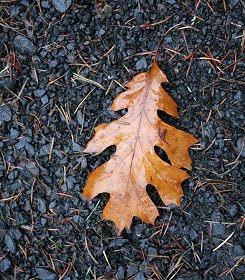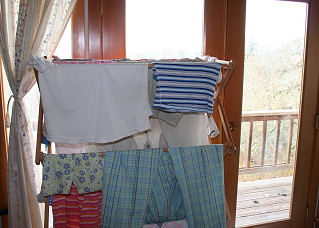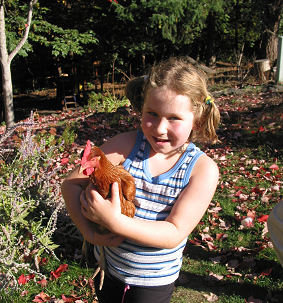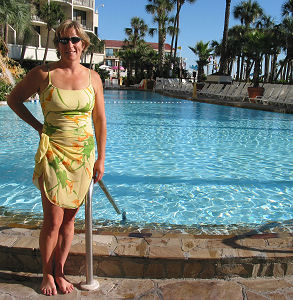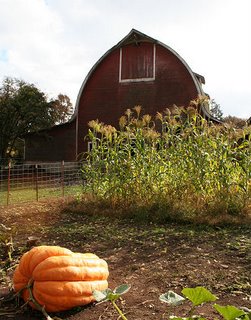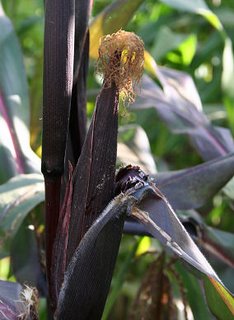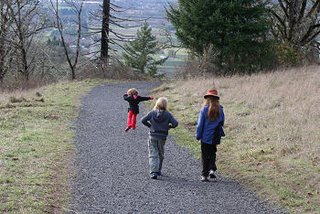
Monoculture
Unschooling has recently been splashed into the national spotlight, with a show on Dr. Phil last Friday, and a fairly positive Sunday article in the NY Times covering an unschoolling family. Of course when this happens, the uninformed masses feel the need to come out of the woodwork declaring that it would be a horror and a shame to not have everyone in the country schooled to some uniform standard that would somehow ensure an educated populace (I don't know if anyone's looked around lately to see that having standardized public education has hardly fulfilled that promise, but I guess that's beside the point).
It all makes me wonder, as I often do, why monoculture is so honored in our society, and diversity, while given lip service, is often ignored. Whether it's a field of perfectly identical genetically engineered corn, with all of its tassels precisely 5 feet 10 inches off of the ground, a "tree farm" (euphemism for "former forest now planted with one species of tree") or a "No Child Left Behind" act that ensures that all the nations children will be able to be tested on precisely the same set of largely meaningless questions, we seem hell-bent on Uniformity Uber Alles.
Nature makes no such mistakes, as we have (hopefully) eventually learned. An ecosystem is a complex interplay of a mind-boggling complexity of organisms. While a pine beetle infestation can easily wipe out a monoculture tree farm, a real live forest rarely falls prey to any one disease or pest, because many species of trees, shrubs, and plants live in competitive and cooperative harmony, ensuring that at least some of them will survive.
Why then, would we want a monoculture of education? The beauty in the diversity of learning that I see among my kids and their friends is that none of them think, do, and learn in exactly the same way. Their interests, their approaches and methods are all uniquely individual. The way they approach a problem, or even the creative solution they end up at might differ greatly from one to the other. Our brains natural follow paths that work best for us, and even something as seemingly simple as how to mutiply 5 by 13 can be done a variety of ways. In a class full of children, all taught the same method, the probability that it will sink in for all of them is low. Some of them will eventually come to call themselves "bad at math", whereas if they had learned in a more organic way that worked for their particular brain and learning style, this concept of "bad at math" would probably never occur to them. I've never heard an unschooled child utter a phrase like this.
The reason these musings are here in my Urban Farm blog instead of over at my unschooling blog is because I see the parallels in nature, in my garden and the species that exist even in my very soil, and the way my kids learn and grow. The diversity I see in the children around me is a thing of organic beauty, like a rich handful of hummusy earth.
Unschooling has recently been splashed into the national spotlight, with a show on Dr. Phil last Friday, and a fairly positive Sunday article in the NY Times covering an unschoolling family. Of course when this happens, the uninformed masses feel the need to come out of the woodwork declaring that it would be a horror and a shame to not have everyone in the country schooled to some uniform standard that would somehow ensure an educated populace (I don't know if anyone's looked around lately to see that having standardized public education has hardly fulfilled that promise, but I guess that's beside the point).
It all makes me wonder, as I often do, why monoculture is so honored in our society, and diversity, while given lip service, is often ignored. Whether it's a field of perfectly identical genetically engineered corn, with all of its tassels precisely 5 feet 10 inches off of the ground, a "tree farm" (euphemism for "former forest now planted with one species of tree") or a "No Child Left Behind" act that ensures that all the nations children will be able to be tested on precisely the same set of largely meaningless questions, we seem hell-bent on Uniformity Uber Alles.
Nature makes no such mistakes, as we have (hopefully) eventually learned. An ecosystem is a complex interplay of a mind-boggling complexity of organisms. While a pine beetle infestation can easily wipe out a monoculture tree farm, a real live forest rarely falls prey to any one disease or pest, because many species of trees, shrubs, and plants live in competitive and cooperative harmony, ensuring that at least some of them will survive.
Why then, would we want a monoculture of education? The beauty in the diversity of learning that I see among my kids and their friends is that none of them think, do, and learn in exactly the same way. Their interests, their approaches and methods are all uniquely individual. The way they approach a problem, or even the creative solution they end up at might differ greatly from one to the other. Our brains natural follow paths that work best for us, and even something as seemingly simple as how to mutiply 5 by 13 can be done a variety of ways. In a class full of children, all taught the same method, the probability that it will sink in for all of them is low. Some of them will eventually come to call themselves "bad at math", whereas if they had learned in a more organic way that worked for their particular brain and learning style, this concept of "bad at math" would probably never occur to them. I've never heard an unschooled child utter a phrase like this.
The reason these musings are here in my Urban Farm blog instead of over at my unschooling blog is because I see the parallels in nature, in my garden and the species that exist even in my very soil, and the way my kids learn and grow. The diversity I see in the children around me is a thing of organic beauty, like a rich handful of hummusy earth.
